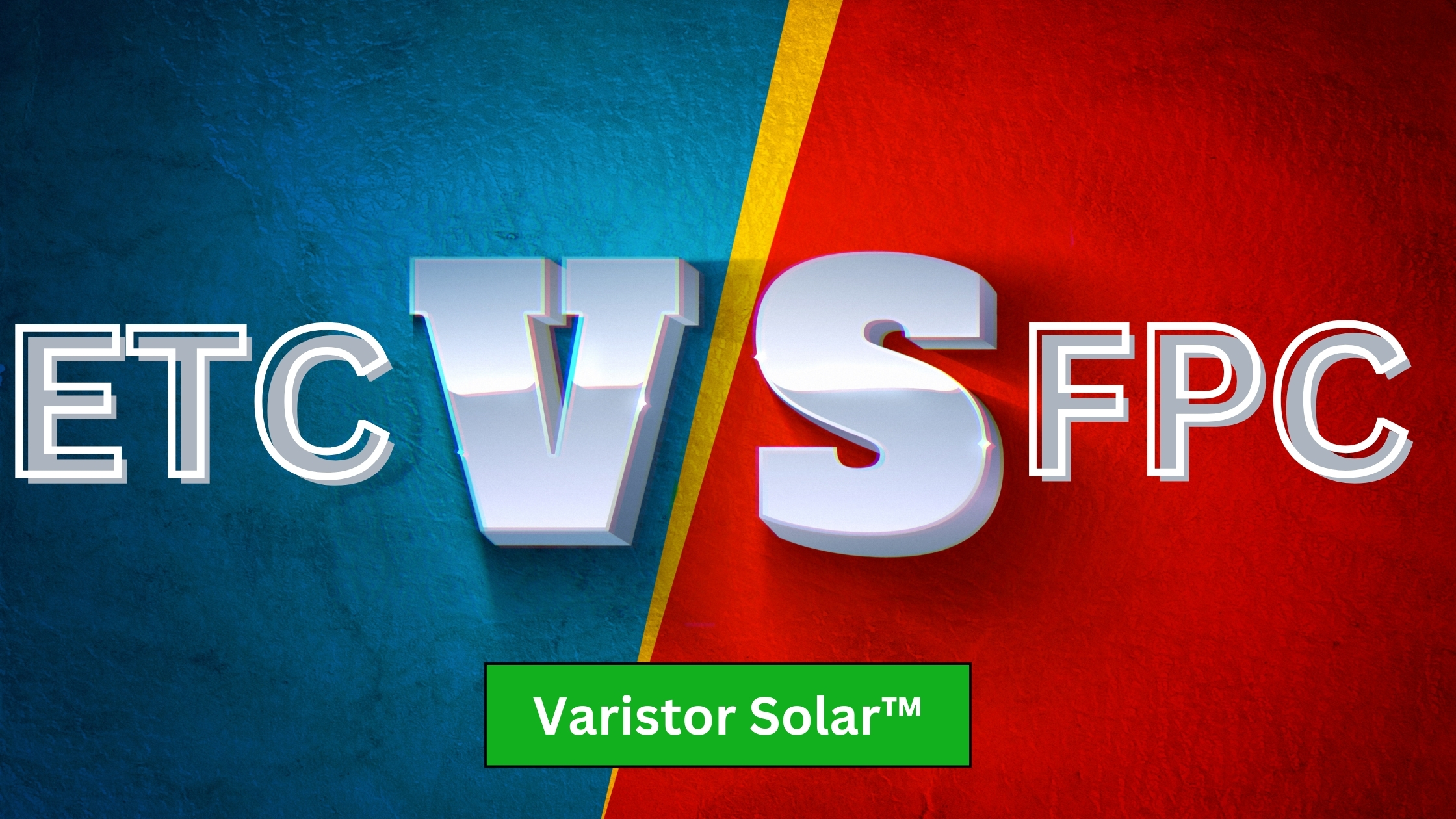
Varistor Solar is dedicated to empowering individuals, businesses, and communities with the transformative power of solar energy. We believe in a brighter, cleaner future and are committed to making sustainable living accessible to everyone.
+91-9113690456
Email: sales@varistorsolar.com
Varistor Solar
NO 40/C, KALKERE VILLAGE,12TH MAIN, NRI LAYOUT,Ramamurthy Nagar, Bangalore North,Bangalore- Karnataka, 560016
Introduction:
In an era where sustainability takes center stage, the quest for energy-efficient solutions has brought solar water heaters into the limelight. Harnessing the power of the sun, these innovative devices offer an eco-friendly alternative to traditional water heating methods. However, the journey to a greener lifestyle comes with choices, and today, we're diving into the world of solar water heaters, exploring the nuances between ETC (Evacuated Tube Collector) and FPC (Flat Plate Collector) systems. So buckle up as we embark on a solar-powered adventure to help you determine the best solar water heater for your needs.
Understanding the Basics: What is a Solar Water Heater?
Before we delve into the specifics of ETC and FPC systems, let's take a moment to understand the fundamentals of a solar water heater. Essentially, these devices use sunlight to heat water, providing a cost-effective and sustainable alternative to conventional water heaters. Consisting of solar collectors and a system to transfer the heat to water, these heaters come in various types, with ETC and FPC being two popular choices.
ETC Solar Water Heaters:
Evacuated Tube Collectors, or ETC solar water heaters, are a marvel of engineering designed to maximize solar energy absorption. These systems consist of a series of glass tubes, each containing a metal absorber tube and a heat pipe. The outer tube is transparent, allowing sunlight to pass through and reach the absorber tube. The inner tube, on the other hand, is coated with a selective absorbing material to enhance heat absorption.
Advantages of ETC Solar Water Heaters:
Efficiency in Low Light Conditions: ETC solar water heaters are known for their efficiency even in low light conditions. The design allows them to capture and utilize diffused sunlight, making them a reliable choice for areas with inconsistent sunlight.
High Temperature Performance: The vacuum in the glass tubes minimizes heat loss, enabling ETC systems to achieve higher temperatures compared to some other solar water heater types. This makes them suitable for applications that require hot water at elevated temperatures.
Durability: The design of ETC solar water heaters is robust, with each tube functioning independently. This means that even if one tube is damaged, the overall system continues to operate, ensuring longevity and ease of maintenance.
Considerations for ETC Solar Water Heaters:
While ETC solar water heaters offer impressive advantages, it's crucial to consider certain factors before making a decision:
Space Requirements: ETC systems may require more installation space compared to FPC systems. The arrangement of multiple tubes necessitates adequate roof space for optimal performance.
Weight: The weight of ETC systems can be a consideration during installation. Ensure that your roof structure can support the weight of the collector tubes.
FPC Solar Water Heaters:
Flat Plate Collector solar water heaters, or FPC systems, are another popular choice in the realm of solar water heating. These systems consist of an insulated metallic box with a flat absorber plate covered with tempered glass or polycarbonate sheet. The absorber plate is painted with a selective coating to enhance sunlight absorption.
Advantages of FPC Solar Water Heaters:
Simplicity and Ease of Installation: FPC systems are renowned for their simplicity and ease of installation. The flat design and straightforward structure make them a preferred choice for residential installations.
Cost-effectiveness: FPC solar water heaters are often more cost-effective than their ETC counterparts. If you're looking for a budget-friendly yet efficient solar water heating solution, FPC systems may be the way to go.
Adaptability: FPC systems are versatile and can be adapted to various geographical locations and climates. They perform well in moderate climate conditions and are suitable for both residential and commercial applications.
Considerations for FPC Solar Water Heaters:
While FPC solar water heaters offer distinct advantages, it's essential to weigh certain considerations:
Performance in Low Light Conditions: FPC systems may not be as efficient as ETC systems in low light conditions. If you live in an area with limited sunlight, this factor should be taken into account.
Temperature Limitations: FPC systems may have limitations in achieving extremely high water temperatures. If your application requires water at elevated temperatures, you may need to assess the suitability of FPC systems for your specific needs.
Making the Decision: Which Solar Water Heater is Best for You?
Now that we've explored the intricacies of ETC and FPC solar water heaters, it's time to make an informed decision based on your unique requirements. To help you navigate this decision-making process, consider the following factors:
Sunlight Availability: Assess the availability of sunlight in your location. If you live in an area with consistent and intense sunlight, both ETC and FPC systems can be viable options. However, if you're in an area with variable sunlight, the efficiency of ETC systems in low-light conditions might be a deciding factor.
Space Constraints: Evaluate the available space for installation. If you have limited roof space, FPC systems may be a more practical choice due to their compact design.
Budget Considerations: Consider your budget constraints. While both ETC and FPC systems offer cost-effective alternatives to traditional water heaters, FPC systems are generally more budget-friendly.
Temperature Requirements: Determine the temperature requirements for your specific application. If you need hot water at extremely high temperatures, the high-performance capabilities of ETC systems might be more suitable.
Conclusion:
In the quest for sustainable living, choosing a solar water heater is a significant step towards reducing your carbon footprint and energy bills. The choice between ETC and FPC solar water heaters ultimately depends on your location, space availability, budget considerations, and temperature requirements. Whichever option you choose, the overarching benefits of harnessing solar energy for water heating are undeniable.
As we conclude our exploration of ETC vs. FPC solar water heaters, it's crucial to highlight that the best solar water heater for you is the one that aligns with your unique needs and preferences. Whether you opt for the efficiency of ETC systems or the simplicity of FPC systems, the decision is a step towards a sustainable and energy-efficient future.
Remember, the journey towards greener living begins with informed choices, and by investing in a solar water heater, you're not just adopting a technology; you're embracing a lifestyle that benefits both you and the planet. So, go ahead, harness the power of the sun, and let your solar water heater be the beacon of eco-friendly warmth in your home.
Now it's Your Turn:
If you're ready to make that leap towards solar water heating, look no further than Varistor Solar™. We pride ourselves on providing top-notch solar solutions, and we believe that when it comes to solar water heaters, Varistor Solar™ is the right choice for you. For any inquiries or if you find yourself in a dilemma about which solar water heater suits your needs, give us a call at 9113690456 or drop us an email at sales@varistorsolar.com. Our team is here to guide you through the process, ensuring that your transition to solar energy is seamless and rewarding.
"WHAT YOU CAN READ NEXT"
 Read more +03 September 2024 in Solar Water Heater
Read more +03 September 2024 in Solar Water HeaterWhich is the Best Solar Heater Brand in Yeshwanthpura, Bengaluru
 Read more +03 September 2024 in Solar Water Heater
Read more +03 September 2024 in Solar Water HeaterWhich is the Best Solar Heater Brand in Yelchenahalli, Bengaluru
 Read more +03 September 2024 in Solar Water Heater
Read more +03 September 2024 in Solar Water Heater





